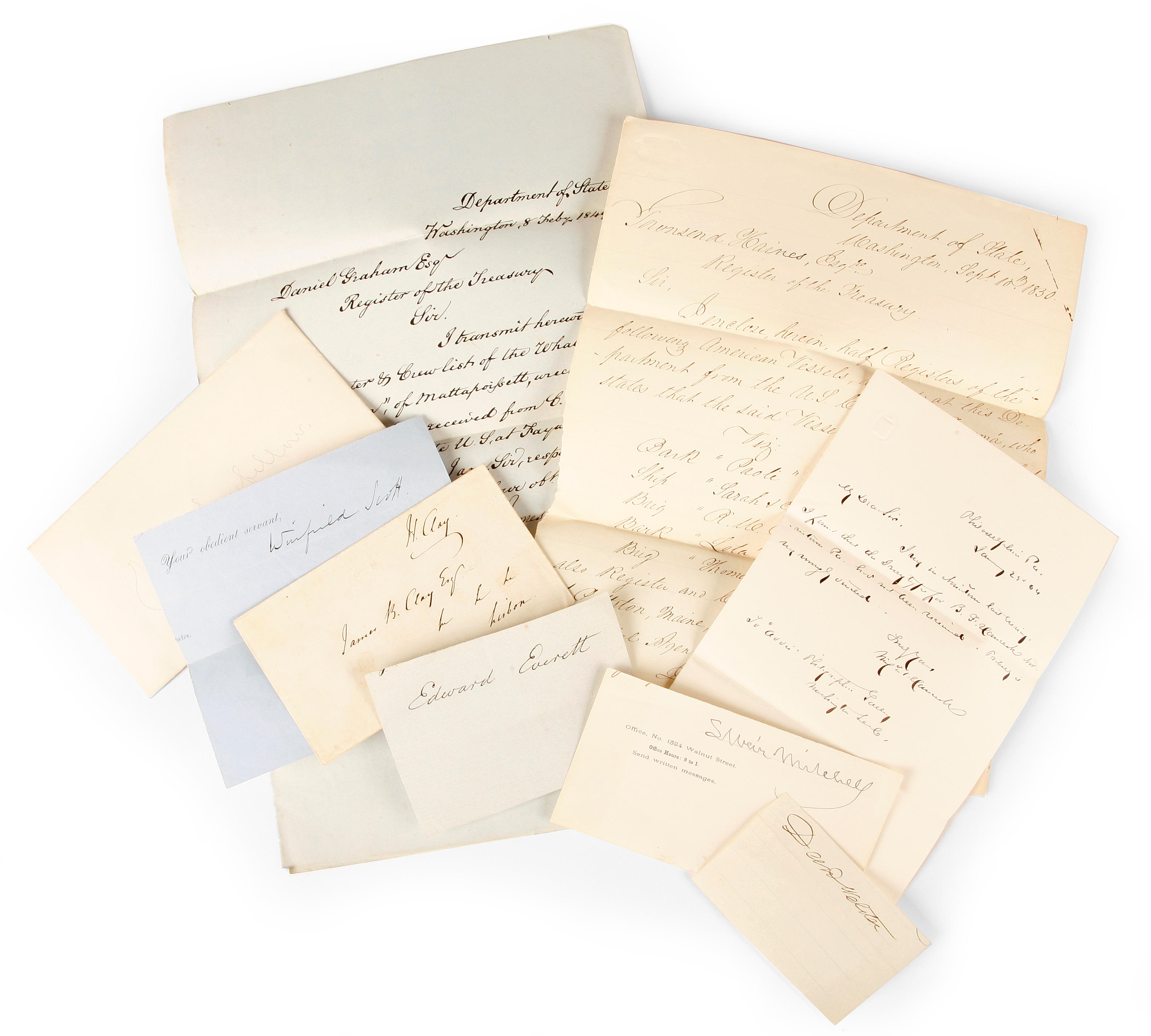WEBSTER, Daniel (1782-1852). Letter signed ("Daniel Webster") to an unidentified recipient ("Sir"), Department of State, Washington, 4 April 1841. 1 page, 4to . THE FIRST DEATH OF A PRESIDENT IN OFFICE: SECRETARY OF STATE DANIEL WEBSTER'S DRAMATIC OFFICIAL ANNOUNCEMENT OF THE PASSING OF WILLIAM HENRY HARRISON Daniel Webster, in his capacity as the senior presidential Cabinet member, provides official notice of the untimely death of the ninth U.S. President, William Henry Harrison. "It has become my most painful duty to announce to you the decease of William Henry Harrison, late President of the United States. This affecting event took place, this day at the Executive Mansion in this City, at thirty minutes before one o'clock this morning." The first President to die in office, Harrison succumbed to "bilious pleurisy" three days and a month after his inauguration following a long, exhausting campaign. The 68-year-old President had delivered a massive, rambling inaugural address which took one hour and 40 minutes to read. The day was chilly, with a brisk wind. Harrison had worn no hat, nor gloves, and was drenched in a rain shower after the ceremony. First a cold, then complications set in, and his condition worsened steadily thoughout March, until his death. "Having no precedents to guide them, the cabinet, with Congress not in session and the Vice-President in Williamsburg, assumed the responsibility for deciding what actions should be taken" (N.P. Peterson, Presidencies of Harrison and Tyler , p. 41). In fact, it was Webster's son, Fletcher, a clerk in the State Department, who was sent to inform Tyler that he was now president. Tyler retained all Harrison's Cabinet appointees, but discord soon developed between the President and his staff over the creation of a new Bank of the United States. All but Webster resigned. He stayed on to complete negotiations of the Webster-Ashburton treaty that resolved the Maine boundary dispute between U.S. and Britain. In 1843 he returned to his law practice, but didn't stay in private life for long. Massachusetts recalled him to the Senate in 1844 and he played a pivotal role in the great slavery controversies of the day: the Mexican War, the Compromise of 1850, and the Fugitive Slave Law.
WEBSTER, Daniel (1782-1852). Letter signed ("Daniel Webster") to an unidentified recipient ("Sir"), Department of State, Washington, 4 April 1841. 1 page, 4to . THE FIRST DEATH OF A PRESIDENT IN OFFICE: SECRETARY OF STATE DANIEL WEBSTER'S DRAMATIC OFFICIAL ANNOUNCEMENT OF THE PASSING OF WILLIAM HENRY HARRISON Daniel Webster, in his capacity as the senior presidential Cabinet member, provides official notice of the untimely death of the ninth U.S. President, William Henry Harrison. "It has become my most painful duty to announce to you the decease of William Henry Harrison, late President of the United States. This affecting event took place, this day at the Executive Mansion in this City, at thirty minutes before one o'clock this morning." The first President to die in office, Harrison succumbed to "bilious pleurisy" three days and a month after his inauguration following a long, exhausting campaign. The 68-year-old President had delivered a massive, rambling inaugural address which took one hour and 40 minutes to read. The day was chilly, with a brisk wind. Harrison had worn no hat, nor gloves, and was drenched in a rain shower after the ceremony. First a cold, then complications set in, and his condition worsened steadily thoughout March, until his death. "Having no precedents to guide them, the cabinet, with Congress not in session and the Vice-President in Williamsburg, assumed the responsibility for deciding what actions should be taken" (N.P. Peterson, Presidencies of Harrison and Tyler , p. 41). In fact, it was Webster's son, Fletcher, a clerk in the State Department, who was sent to inform Tyler that he was now president. Tyler retained all Harrison's Cabinet appointees, but discord soon developed between the President and his staff over the creation of a new Bank of the United States. All but Webster resigned. He stayed on to complete negotiations of the Webster-Ashburton treaty that resolved the Maine boundary dispute between U.S. and Britain. In 1843 he returned to his law practice, but didn't stay in private life for long. Massachusetts recalled him to the Senate in 1844 and he played a pivotal role in the great slavery controversies of the day: the Mexican War, the Compromise of 1850, and the Fugitive Slave Law.














Testen Sie LotSearch und seine Premium-Features 7 Tage - ohne Kosten!
Lassen Sie sich automatisch über neue Objekte in kommenden Auktionen benachrichtigen.
Suchauftrag anlegen